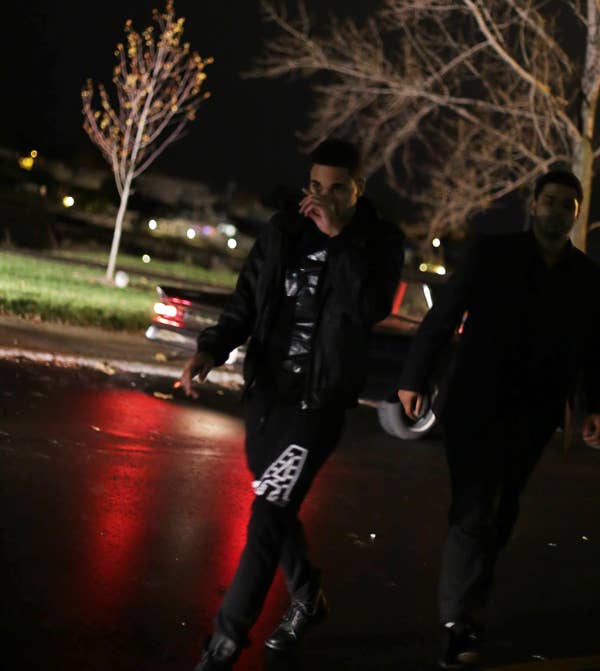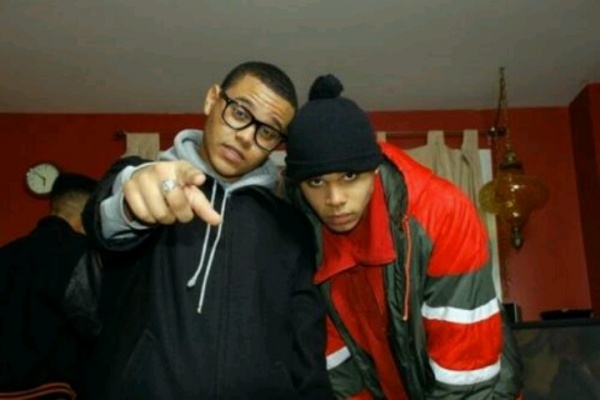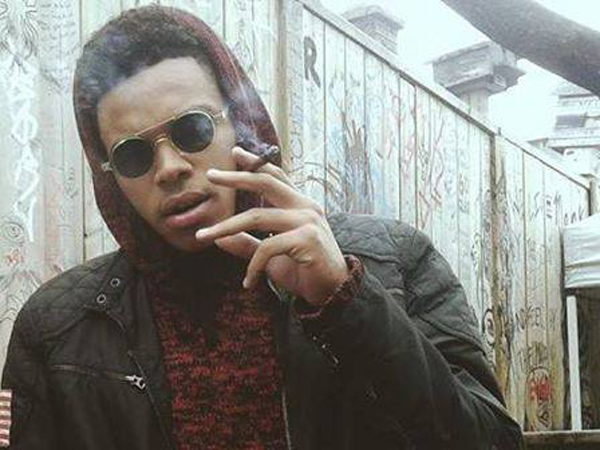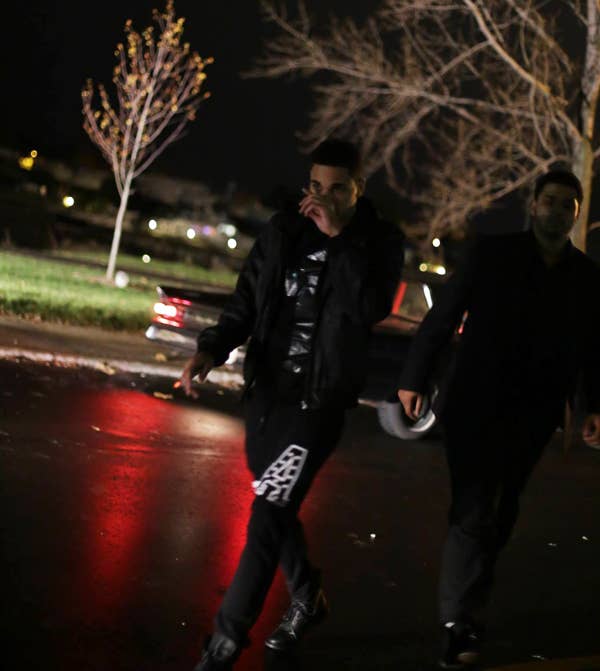1.

Image via Nixxon
By Erika Jarvis
For a year of their short lives, JesseRay and Abel were inseparable. They bonded over hip-hop—both wanted to be famous rappers—and influences at the time included Drake, a young rapper from their city who was blowing up down south.
They lived in East Toronto, in a suburb called Scarborough. It sprawled so far people called it “Scarberia.” It was pretty, fringed by white cliffs that led down into a lake big enough to look like an ocean.
It was also crawling with gangs. Though no angels, the boys were mostly busy with their dreams of stardom. They rapped in people’s bedroom studios and burnt connections sponging free studio time. They never had any money. When the trains stopped at 2 a.m. and they were stuck in the city, JesseRay and Abel would sit writing rhymes in a Tim Horton’s until the sun came up.
JesseRay recalls the time they went to visit a friend in the forest of condos in Toronto’s downtown. They had just been in a fight, and their friend wasn’t answering his buzzer. Unable to get up to the apartment, they sat in the lobby, rapping and singing.
Abel was an incredible singer, his clear tenor somehow surviving Scarborough’s rough-edged hip-hop and reggae influences. He could impersonate anybody, but especially Michael Jackson. JesseRay had heard Abel sing before, but this night he was “emotional,” JesseRay said, and something was different. “Ohhh… Oh my god, how do you sing like that?” he recalled, balling his fist against his chest.
Many years later, I asked a singing teacher about Abel’s voice. He said Abel’s broad, round skull was the perfect instrument for the delicate vibrations and scales that would later make him a global superstar.
Not then though. JesseRay is tall and handsome, like a light-skinned guy you’d see in a Ralph Lauren ad. Abel was shorter, with a shaved head that enhanced his baby face. JesseRay recalls them messaging girls on Facebook, and Abel getting shut down, “Just like, ‘No,’” says JesseRay. “Straight out, ‘No.’”
They called themselves Bulleez N Nerdz, “because we were bullies, but we looked like nerds,” says JesseRay. Bulleez N Nerdz excited flashes of interest from the lower registers of the music industry, like Tyse Saffuri, a manager who, when I contacted him, demanded money to tell his story, then tried to push a female pop act he was working on.
3.

Image via Nixxon
Then in 2009, when JesseRay was 18, one of his best friends killed himself.
Blindsided by grief, he locked himself away. In this hibernation period, JesseRay and Abel drifted apart. Abel moved into the infamous “trap house” in downtown Toronto with two friends, Hyghly Alleyne and Lamar Taylor. When JesseRay finally emerged, he recalls meeting Abel.
“This guy, I run into him and he’s like, ‘Oh, yeah, I’m doing directing.’” JesseRay says. “Or some film shit. He was wearing glasses, he looked like a nerd. I was like ‘Oh, OK.’ Then all of a sudden he dropped that mixtape. And this was all recent, this was all quick. So, maybe it was undercover.”
It was one of the last times he would speak to Abel.
In the spring of 2011, JesseRay was parked in a friend’s Durango, smoking pot outside the high school he’d dropped out of the year before. They were listening to a mixtape on someone’s iPod, a strange mix of synths and a tremulous, girlish falsetto that some people said reminded them of Michael Jackson. It had been released by a guy from his neighborhood, and it felt like everybody was talking about him, including Drake. Nobody knew who or what it was. JesseRay did. He could put a face to that voice.
Now calling himself “The Weeknd,” Abel wasn’t doing interviews, even as music bloggers indulged in paragraphs of adjectives to describe his cough-syrup style of R&B. “Did you hear that one time when Drake called Abel at the radio station,” JesseRay says, “and you hear Abel’s voice? That’s exactly why he doesn’t [do interviews]: ’cause he sounds high [pitched].” For a brief moment, in the spring of 2011, JesseRay was in possession of one of music’s best kept secrets.
“Before that I didn’t used to take recording seriously,” says JesseRay. “Then I took recording a hundred times more seriously.”
JesseRay was working in a mall at the time, at a restaurant called Mr. Green Jeans. This is where he met Channing Anderson, a short, sweet guy who also made beats.
Channing introduced JesseRay to Ersan, a bespectacled third-generation seller of exotic fish supplies. Ersan sponsored a recording studio for them out the back of his parents’ store, and spent over $10,000 on the studio. Past the tanks of glimmering live coral there was a door, and behind that door was the studio, with a computer and a booth, and piles of thin mats that JesseRay slept on when nights turned to early mornings. They formed a label and called it “Star City.”
In the spring of 2013, I went to the studio. The skies in Toronto had just switched from spring to summer weather and then back again, carpeting the city with colds. JesseRay said it felt like his chest was “going to explode.”
He opened the door to a sunny courtyard out back, strewn with bits of aquarium hose, and handed me an orange, which we ate standing over an open garbage can.
At that time, downtown Toronto was plastered with posters for Abel’s upcoming album, Kiss Land.
“Abel’s first show at Mod Club, P. Diddy and all these big label representatives were there, and this guy was scared, man,” he told me. “Like, I remember I had a conversation with him and Zack”—a mutual friend—”afterwards about it. He was scared. He was like, ‘I honestly didn’t even know how much people, like, liked me until I was on stage. And they were singing my lyrics.’ I was like, ‘That’s amazing.’”
“I’m turning 23 in a few weeks and it makes me feel like I’ve really got to get something happening,” he told me.
One thing to know about JesseRay: success has been a knowable force for him ever since childhood. Before Abel found fame, JesseRay grew up visiting his uncle, a former Stanley-cup winning hockey player turned Blackhawks coach, in Chicago.
“I used to go and watch games from the sky box,” he told me. “All the people in the Hall of Fame from Chicago were always around. It was crazy, ’cause I grew up playing hockey too, right? And it made me realize like, no, man, they’re just human beings. We look up to them like gods. They just have a talent, that’s all it really is.”
As an amateur hockey player, he said he “didn’t know anyone who was better” than him. If that was so, I wanted to know, how come he never went pro? He had been rising up through the ranks, he said, until he was about 11, when he was watching TV in his bedroom at his mom’s house. He smelled something strange, and a few minutes later, black smoke curled into the room. The hallway was a tunnel of black smoke. Feeling his way past the burning kitchen, he barely located his passed-out-drunk mom by the light of the TV. He dragged her out of the house, saving both of their lives.
After that, JesseRay and his sisters went to live with his dad. In Canada, pro hockey careers are as much a product of talent as certain resources, like a two-parent household and a car. The hockey dream faded.
This is what JesseRay’s music sounds like: he hits “play” on a bunch of waveforms on his screen, and floods the room with synths. His preference is for the “epic”: epic moods, epic pads. When he shoots video, he prefers slow-mo because it’s more “epic.”
Like “Gold.” He says he made it when he was wasted in the studio, early in the morning. It starts with more of those cathedral-filling synths, then around the one-minute mark, comes in with a kick drum and a hair-raising oo-hoo-hoo vocal. The day I visited him at the fish store, I told him it was my favorite. I watched a frisson of reaction scud across his face. “A lot of people like that track,” he said.
Ersan tried hustling for JesseRay. Through YouTube, they made contact with the manager of an artist called Dru. If you’ve never heard of Dru, he was a white guy who had a moment in the summer of the ‘00s with a party track and then disappeared (he also has seemingly vanished from YouTube).
Ersan and JesseRay drove up to the manager’s house in Richmond Hill, a new-money suburban housing development north of Toronto.
JesseRay was surprised to find this “street-looking guy,” he said, in a “big, empty house,” generously appointed with the most modern of furnishings.
Their host retrieved an envelope from the top shelf of his kitchen. “This guy’s like, ‘Just watch,’” said JesseRay. “‘I’ll show you.’ In my head I’m like, this guy’s racking it off Dru? Dru sucks, man. … But then you look at the papers, and oh my God, it’s actually a business.”
A few weeks after my visit to the fish store, I got a call from JesseRay at 4:49 a.m.
He was in the mood to talk, possibly high. A few nights before, he had been to The Hoxton, a Toronto club with a reputation for putting on rising R&B acts. There he’d run into Hyghly, who told him he followed him on Twitter. JesseRay told me he was about to release his debut album, 1990. It would have a few collaborations on there, he said, but who with, “I don’t even want to tell you right now.”
“I’ve seen people not work a fucking day in their life and now they’re making $100,000 a show,” he told me. “You know? Like, personally, been with these people, broke, rolling up a roach spliff between ten people. And now they’re worth $100,000 a show on tour. And it just shows me how real life could be.”
I lost touch with JesseRay for a few years after that. 1990 came out, along with a bunch of handsome, moody videos. A few radio stations played “Gold,” but I did not hear much about JesseRay after that.
In the weeks leading up to this month’s Beauty Behind the Madness, I heard The Weeknd playing in every passing car. It felt like the time to reach out.
On Facebook, JesseRay was grateful for the opportunity, but said he did not want to have The Weeknd written all over him anymore.
He has achieved a strange degree of fame: At the time of writing, approximately 22,000 people follow JesseRay on Twitter, and a similar number on Instagram. Some of them have “JesseRay” in their bios, the same way others put Justin Bieber or the name of a Jonas brother. Many of them are Weeknd fans, he says, who message him every day, asking things like, “Is there any music you guys haven’t released?”
He told Hip-Hop Canada that it “takes its toll.” He’s now changed his name to Nixxon, which he says represents “something darker” as well as his transition as an artist.
Star City is no longer. This is how it ended: JesseRay, Channing, and Ersan were planning a video shoot east of the city. Organizing it was a huge production. They had guns with blanks, a team to supervise the firearms, and professional camera operators.
But on the day of the shoot, multiple video extras cancelled. They ended up with fewer people than their vision required, so they postponed.
Some days later, JesseRay saw that Ersan had emailed their PR rep, Jonathan Sawyer, saying that the video had been shot and that it was in editing.
There was a huge argument over the phone. Ersan hung up. When JesseRay got to the studio, Ersan had changed the lock. JesseRay never spoke to Ersan again.
This fall, JesseRay/Nixxon will release a new EP, For No Good Reason. He just put out a song and video called “Beast,” which he made spontaneously late at night in downtown Toronto with a bunch of stuff he scooped from the army surplus store.
“It’s been a year, but nigga I’m back/
I feel like I’m Red from Orange Is the New Black.”
He lives on a farm outside Toronto with his new girlfriend, whose parents grow asparagus and sweet corn. During the day, JesseRay works inspecting water park slides for safety. At night he comes home, has a few beers, and makes music.
JesseRay will return to Toronto around Christmas. He has been chatting with guys like Jimmy Prime (who, he claims, wanted to be on Star City a long time ago, but Ersan said no), and has realistic goals like playing The Hoxton.
As for Abel, Jesse Ray says he thinks the new record is “amazing”: “I play him now more than I ever did.”
When I met JesseRay in 2013, he was restless, fretting about turning 23 and not being where he wanted to be. Now, he’s the freest and most relaxed I’ve ever seen him. When I ask him if he thinks he’s going to make it, he says, “I’m not trying to think of it. I used to. Every day. I know it’s very possible, obviously, but I don’t want to think of it as ‘making it.’ I just want to think of it as being better than yesterday, or progressing, not being the same guy I was last day or last week.” So for now, he’s happily singing and recording in the studio. Alone.
11.

Image via Nixxon



